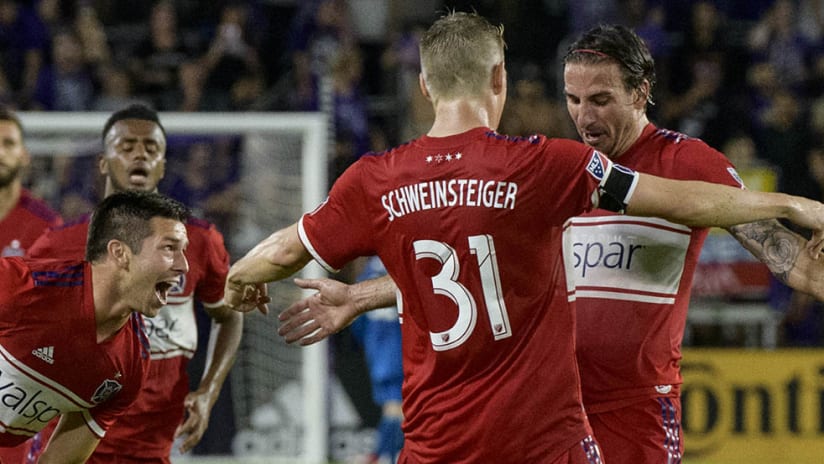There’s a truth about soccer that I’ve never heard a good explanation for yet I know to be true: The end of the game looks very different than the start of the game. The start of a game makes sense and involves passing and team shape. The end of a game is chaos and involves long balls, tired shuttles and hectic goal-area scrambles. It’s not always true, of course. But as a general rule, the end of a soccer game is a different beast than the beginning of one.
Yet, how often do teams plan for that? How often do we think about the varied states of games?
On Saturday night, Alan Gordon scored the game winner to lift the Chicago Fire to a 2-1 victory over Orlando City. It was Gordon’s 22nd career goal when coming off the bench. There’s perhaps no one more synonymous with late-game heroics than him. He always seems to find a way to make a difference at the end of a game. Yet it feels like another reminder how underutilized the Gordon-phenomena is.
Gordon isn’t an All-Star player in most facets of the game. He’s not overly fast; he doesn’t have great command of the ball. But he’s extraordinary at a few parts of the game. He’s incredible in the air; he’s fearless and reckless; he competes for every loose ball; and he has a knack for finishing.
Do those skills seem to line up with a part of the game?
Gordon might not be the perfect guy to start a game for most teams, but he’s certainly the perfect guy to finish one. Since he’s never overly impressed as a starter, we’ve devalued his contributions. We often forget the basic premise of the sport: The team that is winning at the end wins the game. Those finishing stages are often more important than the beginning ones. We like to think of soccer as the sport we see in the first 30 minutes, but the actions over the last 10 generally determine games and seasons.
Every team should have an Alan Gordon. Maybe he or she can’t be as good as Gordon, or as good at being Alan Gordon as Alan Gordon. But the basic tenets are out there in the marketplace: athletic, competitive, scrappy, strong in the air. You aren’t looking for someone to connect passes in the 60th minute. You are looking for someone to hang around the box in the 90th minute.
Call it the Alan Gordon Theorem.
I cringe whenever a team late in the game sub in a player who fights for a starting spot. I get it - that player is the next best player at the position. But he’s the next best at the game that occurs at the start of the match. We shouldn’t think about who’s next on the depth chart. We should be thinking about who is right for that specific moment. Every team should have a player for that exact moment (and others, such as closing games out when winning).
Gordon proved once again Saturday night why he is so valuable to a club. Eastern Conference points are at a premium this year. Every intra-conference matchup is a six-point contest. Every goal means so much.
When you need that critical goal, who is your team’s Alan Gordon?














